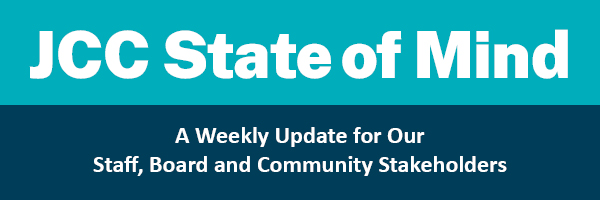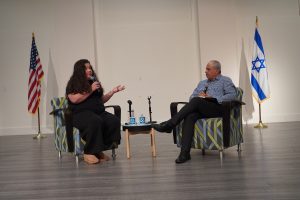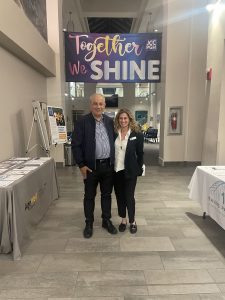Posted by
Jason Kunzman, JCC President and CEO on September 20, 2024


This past week, along with 7 members of the JCCPGH board of directors and professional staff, I attended JSummit, a conference of the JCC Association that has been bringing together delegates of the JCC Movement every other year since 1917. Different from other conferences throughout the year, JSummit convenes both professional and volunteer leaders from a cohort of more than 170 JCCs to learn, network, share and acquire tools and ideas to guide our respective communities to new heights. Having been on hiatus since 2018 due to the global pandemic, the 2024 edition of this critical biennial gathering took on increased significance as current societal challenges have not only amplified the role of JCCs as vital centers of Jewish life but also as community destinations for people of all faiths and backgrounds to find positive, meaningful experiences.
While the overarching purpose of JSummit is to solidify and empower the JCC Movement, one of the major themes this year was the power of peoplehood. As described by Mordecai Kaplan, founder of Reconstructionist Judaism, peoplehood is about making the collective experience yield meaning not only for the enrichment of the life of individuals but also for the spiritual greatness of an entire people. As such, core principles of peoplehood must include an understanding that differences enrich human interactions and an appreciation for the healthy tension between continuity and change. At JSummit, my JCC colleagues and I attended a number of workshops and plenary sessions to more deeply explore the concept of peoplehood and what it might take to create an environment to harness a more supportive and inclusive community.
Rachel Fish provided a historical retrospective examining the North American Jewish community’s relationship to Israel and the pressure points that challenge this relationship. She shared research that shows 75% of Jews between 18-40 years of age believe that both Jews and Palestinians have a right to self-determination. At the same time, nearly half of the same group of young Jews don’t know what the word “Zionism” means and 82% are looking to become more knowledgeable in general about Israel, learn from a variety of viewpoints, hear multiple narratives and find ways to advance peace. Rachel challenged the JCC Movement, given the dramatic increase in Jew hatred since October 7th, to double down on its role in creating a communal orientation where brave spaces exist and true diversity of opinion is respected and discussed.
Later in the conference, Zack Bodner from the Oshman Family JCC in Palo Alto, CA spoke about the Z3 Project, which seeks to foster a thriving Jewish future through meaningful dialogue between Diaspora Jewry and Israel. Very much in the business of creating spaces for dynamic debates, Z3’s operating principles are (1) Unity, not uniformity, (2) Engaging as equal partners and (3) Diversity of voices. While focused on bridging divides within the Jewish community, both at the local and global levels, I found the approach Zack introduced and modeled through a panel discussion with Mijal Bitton, scholar-in-residence at the Maimonides Fund, and Haviv Retting Gur, senior analyst at the Times of Israel, to be extremely relevant in our JCC’s efforts to activate community in building a stronger and more inclusive future. Our entire Pittsburgh delegation walked away from this portion of the conference with a much better understanding of how important it is for our JCC, as called out on the Z3 website, to create a robust ecosystem of ideas and leaders to support resilience and connectivity.
-

-

And while all of this was happening in Chicago, our JCC was putting many of these concepts into practice. On Wednesday night, in partnership with the Jewish Federation of Greater Pittsburgh, we hosted Mohammad Darawshe to learn from his lived experience as an Israeli Arab and to have a community conversation on what is necessary for creating a truly shared society between Israeli Jews and Israeli Arabs. Mohammad is a Shalom Hartman Institute faculty member and Director of Planning, Equality and Shared Society at Givat Haviva. Mohammad’s accomplishments and accolades are too many to list and he is one of the world’s most sought-after experts on Jewish-Arab relations. While some of the nearly 300 in attendance may not have agreed with everything Mohammad had to say, when put in the context of the grand body of his work and his dedication to making Israeli society work to its fullest potential, most acknowledged the need to hear his perspective and to respond to it.
The return of JSummit was a much-needed accelerant to the JCC Movement and our local JCC’s efforts in building the core skillset of professional and volunteer leadership necessary for meeting the demands of an increasingly challenging landscape. And as we have demonstrated time and time again, the JCC is an agency in constant motion, putting its learnings to use in real-time and never shying away from embracing divergent views as a means of promoting a more vibrant and dynamic community, one that is positioned to engage and grow together.
Wishing you and your families a Shabbat shalom,
Jason